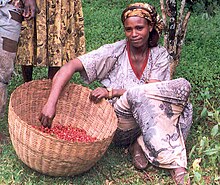Coffee crisis
As coffee crisis refers to the dramatic decline of coffee - world market prices between 1998 and 2004 and the resulting impact on coffee producers around the world. According to the International Coffee Organization , this period was "the worst period of low prices ever recorded".
causes
Since 1962 the world coffee market between producing and consuming countries has been regulated by an international agreement of the International Coffee Organization . Quotas were set for each coffee-producing country in order to avoid overproduction and thus a fall in prices.
During the Cold War , the United States supported the international coffee deal to prevent impoverished coffee farmers from joining communist movements. After the end of the Cold War , the coffee agreement lost this benefit, which is why the USA (largest consumer country) withdrew from it. The agreement had already been weakened by intense bargaining over the distribution of quotas. In 1989 it was finally suspended; every country was now allowed to produce and export any amount of coffee.
Until the 1990s, Brazil , Colombia and Indonesia were the three largest coffee producing countries. Then the World Bank began to promote coffee cultivation, especially in Vietnam . The Southeast Asian country was supposed to use the proceeds from coffee exports to settle its foreign debts. In order to create coffee plantations, rainforests were cleared and indigenous people were expelled. Vietnam, previously insignificant on the coffee market, rose to become the second largest coffee producer behind Brazil by 1999. Coffee cultivation was also expanded in other countries, such as the Ivory Coast .
This led to overproduction - more coffee was produced than consumed. According to the laws of the market , prices fall if there is an oversupply. From 1998 the world coffee market price collapsed; it sank to a level that had not been undercut in the past 50 years.
consequences
This had far-reaching consequences for the approximately 25 million people who mainly lived from coffee production in developing countries. Coffee-growing smallholders became impoverished and farm workers lost their jobs.
Some examples of the concrete consequences:
- In the traditional coffee-growing areas of Kenya , school attendance rates fell, while child labor increased on the plantations; the coffee farmers could no longer afford the school fees.
- In Central America , 200,000 farm workers lost their jobs.
- In Ethiopia , the country of origin of coffee, there was a hunger crisis in 2003 , which was clearly related to the coffee crisis and the subsequent impoverishment of the coffee farmers.
The situation calmed down
In 2006 the situation on the world coffee market calmed down somewhat and prices rose again. The demand for coffee, especially in emerging economies such as China and in Eastern European countries, increased and the supply fell.
Some coffee farmers have switched to growing other, more lucrative products such as coca or (in East Africa) the drug Kath . Others starved to death or migrated to the cities. All of this led to a reduction in overproduction. If prices rise, new producers / plantations could start growing coffee and cause another overproduction crisis.
“ Fair trade ” tries to support small coffee farmers by guaranteeing them a minimum living price regardless of the fluctuations in world market prices.
Coffee Agreement 2007
The International Coffee Organization, which in 2007 included 31 importing countries and 45 exporting countries as well as the European Community as an international institution, adopted an international coffee agreement in 2007 to strengthen the global coffee industry and promote its sustainable development through numerous measures. It came into force in 2011 and has a term of 10 years.
Web links
- The coffee industry crisis (Part I): Cultivation, harvest and export - causes of the drop in the price of green coffee
- The Coffee Industry Crisis (Part II): Ways Out of the Global Price Crisis
Individual evidence
- ↑ a b c Comparative analysis of world coffee prices and manufactured goods. (.pdf) International Coffee Organization (ICO), February 17, 2014, accessed on April 25, 2020 (English, page 3).
- ↑ "Coffee ready? How the coffee crisis is driving smallholders to ruin", documentation of the Bern Declaration , 2003
- ↑ "Millions of misery due to falling world market prices", Deutsche Welthungerhilfe e. V., 2002
- ↑ ico.org : TOTAL PRODUCTION CROP YEARS 1990/91 TO 1999/00 ( Memento from July 6, 2010 in the Internet Archive ) (PDF; 30 kB)
- ↑ "Africa is sick because of agriculture", Tages-Anzeiger of June 7, 2002
- ↑ Jean Ziegler : The Empire of Shame . C. Bertelsmann Verlag.
- ↑ International Coffee Agreement 2007. EUR-Lex , June 16, 2008, accessed March 12, 2013 .

